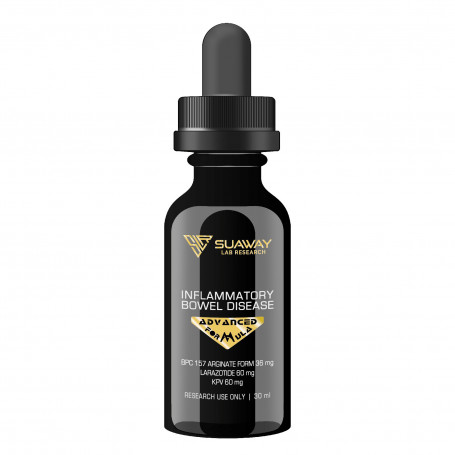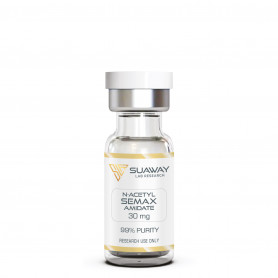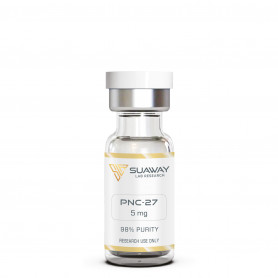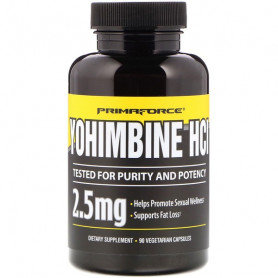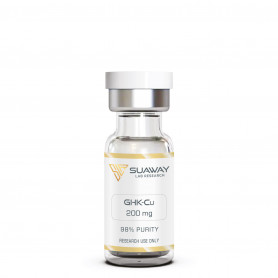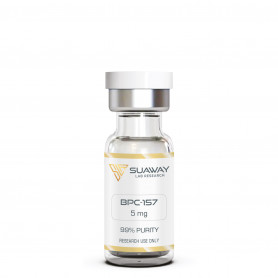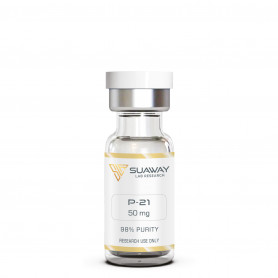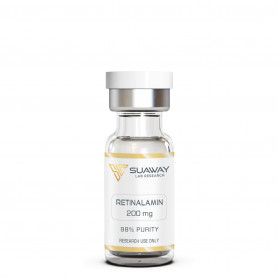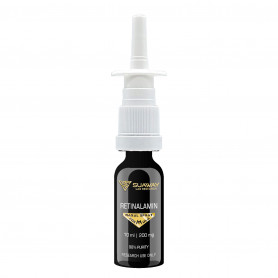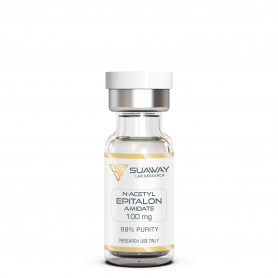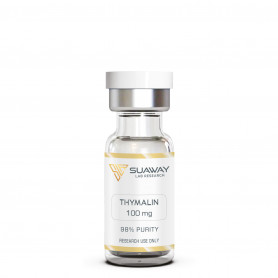INFLAMMATORY BOWEL DISEASE - 30ml
INFLAMMATORY BOWEL DISEASE - ADVANCED FORMULA
30 ml: BPC-157 Arginate Form 36mg; Larazotide 60mg; KPV 60mg
Promotes Gut Healing
Wound Healing
Anti-Inflammatory
Anti-Microbial
Gut Issues: Ulcerative Colitis & Inflammatory Bowel Diseases (IBDs)
Brain-Gut Axis Benefits
FRESHLY PREPARED SOLUTION
Beschreibung
STRUCTURE
BPC-157 ARGINATE FORM
Sequence: Gly-Glu-Pro-Pro-Pro-Gly- Lys-Pro-Ala-Asp-Asp-Ala-Gly-Leu-Val x 2 x L-Arg
Molecular Formula: C62H98N16O22
Molecular Weight: 1419.556 g/mol
CAS number: 137525-51-0
Peptide purity: greater than 98%
Other details: No TFA Salt, No Mannitol
LARAZOTIDE ACETATE
Sequence: GGVLVQPG
Molecular Formula: C32H55N9O10
Molecular Weight: 725.845 g/mol
CAS number: 158818-34-7
Peptide purity: greater than 98%
Other details: No TFA Salt, No Mannitol
KPV
Sequence: Lys-Pro-Val
Molecular Formula: C16H30N4O4
Molecular Weight: 342.43 g/mol
CAS: 67727-97-3
Peptide purity: greater than 98%
Other details: No TFA Salt, No Mannitol
DESCRITPION
BPC 157, Larazotide, and KPV are all peptides with important functions in the gastrointestinal tract. Their properties overlap, but are different enough that using them together may provide synergistic benefits in the setting on intestinal inflammation
BPC-157 ARGINATE FORM
BPC-157 arginate form is very stable in human gastric juice and boosts the oral bioavailability from less than 3% to greater than 90%. BPC 157 arginate salt is also more stable in varied temperature environments and can resist the effects of UV light. Studies show that just 5% of BPC 157 arginate is degraded after 5 hours in gastric acid as compared to 98% of the acetate salt with oral administration. The enhanced oral bioavailability of the arginate salt makes it the preferred choice in BPC 157 oral research.
Wound and Gut Healing
Endogenous BPC production in the stomach maintains the integrity of the entire GI tract, protecting the mucosal barrier from acids and exogenous substances and foods that are known to damage tissues. BPC-157 not only maintains the integrity of the gut, but also promotes systemic healing of wounds, not limited to burns, gastric ulcers, and lacerations by promoting angiogenesis, overall cell growth and repair.
Cell Growth and Angiogenesis
Research has shown that BPC-157 increases blood vessel growth in all areas of the body. A study of chicken embryos demonstrated that BPC-157 increases vascular growth through the activation of cell surface receptors in the Nitrous Oxide pathway, growing new vessels toward the injury. This implies potential treatment of heart disease, overall cellular repair for life extension, and other general healing.
Drug Side Effects, Ulcers and Heart Attacks
BPC-157 has been shown to heal gastrointestinal, liver and brain lesions as a result of side effects produced by the use of NSAIDS, or non-steroidal anti-inflammatory drugs such as Celecoxib, Ibuprofen, Advil, etc. NSAIDS are known to cause ulcers, internal bleeding, heart attacks and various other dangerous conditions.
Anti-Inflammatory and Antioxidant
A study demonstrated that BPC-157 is a powerful antioxidant by reducing free radical formation via the Nitric Oxide system, attenuating duodenal lesions in rats by significantly decreasing oxidative stress.
Brain-Gut Axis Benefits and Antidepressant
BPC-157 was shown to modulate serotonin and dopamine with central influence benefits. A comparison with antidepressants found that BPC-157 was effective in attenuating depression.
LARAZOTIDE
Larazotide is a Zonulin receptor antagonist, a tight junction modulator. Larazotide inhibition of zonulin results in reducing trafficking across epithelial cells in the intestines and reducing intestinal permeability and "leaky gut," thought to be a gateway to multiple autoimmune diseases, including celiac disease, irritable bowel syndrome (IBS), inflammatory bowel diseases (IBD, Crohn′s and ulcerative colitis), type 1 diabetes mellitus (T1DM), nonalcoholic steatohepatitis (NASH), chronic kidney disease (CKD), Hashimoto's thyroiditis and several others. It has been shown to inhibit the effect of inflammatory cytokines such as tumor necrosis factor (TNF-alpha) and interleukin (IL-4), blocking their increase of intestinal epithelial permeability.
KPV
KPV is a peptide that is naturally produced in the body. It is found in the hormone alpha-MSH. It is used for inflammation, gut health and conditions such as Inflammatory Bowel Disease
Anti-Inflammatory
KPV exerts its anti-inflammatory function inside cells, where it inactivates inflammatory pathways. KPV enters the cell and interacts directly with inflammatory signalling molecules inside the cell. It enters the nucleus of the cell and, once there, can inhibit the interaction of inflammatory substances and molecules.
Anti-Microbial
In addition to its anti‐inflammatory effect, KPV also has antimicrobial effects against pathogens. Its antimicrobial effects were demonstrated on two major pathogens called staphylococcus aureus and Candida albicans. In one study, KPV significantly inhibited staphylococcus aureus from forming colonies.
Wound Healing
Research in wound healing shows KPV can speed wound healing, reduce infection, fight inflammation, and lead to better cosmetic results. Often with wounds, various microbes enter the wound. KPV, with its anti-inflammatory and anti-microbial properties, can be very helpful for combatting these microbes and healing wounds.
Gut Issues: Ulcerative Colitis & Inflammatory Bowel Diseases (IBDs)
KPV significantly decreased inflammation in colitis. It decreases the inflammatory response by inhibiting proinflammatory cytokine (molecule) synthesis and secretion. KPV can stop the proinflammatory mechanisms in both intestinal epithelial cells and immune cells. It can interact directly with immune cells which can reduce inflammation. KPV may help in the case of IBDs through inhibited immune responses. Taken orally, KPV reduces the incidence of colitis, as shown by a decrease in proinflammatory cytokines. In the case of colitis, KPV reduced weight loss, colonic activity and decreased inflammation and proinflammatory cytokine levels.
Cancer
KPV treatment is able to decrease tumorigenesis. KPV was sufficient to decrease the inflammation of carcinogenesis. Using KPV before the development of colon cancer might be a preventive way to stop colonic carcinogenesis before it begins. The precise mechanism by which KPV decreases tumorigenesis is not yet fully understood.
REFERENCES
G. Dalmasso et al., "PepT1-Mediated Tripeptide KPV Uptake Reduces Intestinal Inflammation" [Gastroenterology]
S.J. Getting et al., "Dissection of the Anti-Inflammatory Effect of the Core and C-Terminal (KPV) α-Melanocyte-Stimulating Hormone Peptides" [Journal of Pharmacology and Experimental Therapeutics]
B. Xiao et al., "Orally Targeted Delivery of Tripeptide KPV via Hyaluronic Acid-Functionalized Nanoparticles Efficiently Alleviates Ulcerative Colitis" [PubMed]
S.C. Land "Inhibition of cellular and systemic inflammation cues in human bronchial epithelial cells by melanocortin-related peptides: mechanism of KPV action and a role for MC3R agonists" [PMC]
T.A. Luger et al., "α‐MSH related peptides: a new class of anti‐inflammatory and immunomodulating drugs" [PMC]
M. Bohm et al., "Are melanocortin peptides future therapeutics for cutaneous wound healing?" [Wiley Online Library]
E. Viennois et al., "Critical Role of PepT1 in Promoting Colitis-Associated Cancer and Therapeutic Benefits of the Anti-inflammatory PepT1-Mediated Tripeptide KPV in a Murine Model" [PMC]
S. Khaleghi et al., "The potential utility of tight junction regulation in celiac disease: focus on larazotide acetate" [Sigma-Aldrich]
A. Duzel et al., "Stable gastric pentadecapeptide BPC 157 in the treatment of colitis and ischemia and reperfusion in rats: New insights" [PMC]
P.S. Sikiric et al., "Effect of Pentadecapeptide BPC 157 on Gastrointestinal Tract" [Karger]
R. Klicek et al., "Pentadecapeptide BPC 157, in Clinical Trials as a Therapy for Inflammatory Bowel Disease (PL14736), Is Effective in the Healing of Colocutaneous Fistulas in Rats: Role of the Nitric Oxide-System" [ScienceDirect]
P. Sikiric et al., "Focus on Ulcerative Colitis: Stable Gastric Pentadecapeptide BPC 157" [Department of Pharmacology and Department of Pathology, Medical Faculty University of Zagreb, Croatia]
S. Seiwerth et al., "Stable Gastric Pentadecapeptide BPC 157 and Wound Healing" [Department of Pathology, School of Medicine, University of Zagreb]
Y. Jin et al., "P023 Identification of regulated mechanistic pathways and genes to protect intestinal barrier injury by larazotide acetate in an IBD microenvironment" [ECCO]
J. Troisi et al., "The Therapeutic use of the Zonulin Inhibitor AT-1001 (Larazotide) for a Variety of Acute and Chronic Inflammatory Diseases" [PubMed]
N.E. Castillo et al., "Celiac Disease as a Model Disorder for Testing Novel Autoimmune Therapeutics" [ScienceDirect]
Z.M. Slifer et al., "Larazotide acetate: a pharmacological peptide approach to tight junction regulation" [American Journal of Physiology-Gastrointestinal and Liver Physiology]
C.P. Kelly et al., "Larazotide acetate in patients with coeliac disease undergoing a gluten challenge: a randomised placebo-controlled study" [AP&T]
B. Jancin "Larazotide eased symptoms in phase II celiac trial" [MDedge]
T. Vanuytsel et al., "The Role of Intestinal Permeability in Gastrointestinal Disorders and Current Methods of Evaluation" [Frontiers]
DISCLAIMER
This product is intendend for lab research and development use only. These studies are performed outside of the body. This product is not medicines or drugs and has not been approved by the FDA or EMA to prevent, treat or cure any medical condition, ailment or disease. Bodily introduction of any kind into humans or animals is strictly forbidden by law. This product should only be handled by licensed, qualified professionals.
All product information provided on this website is for informational and educational purposes only.

